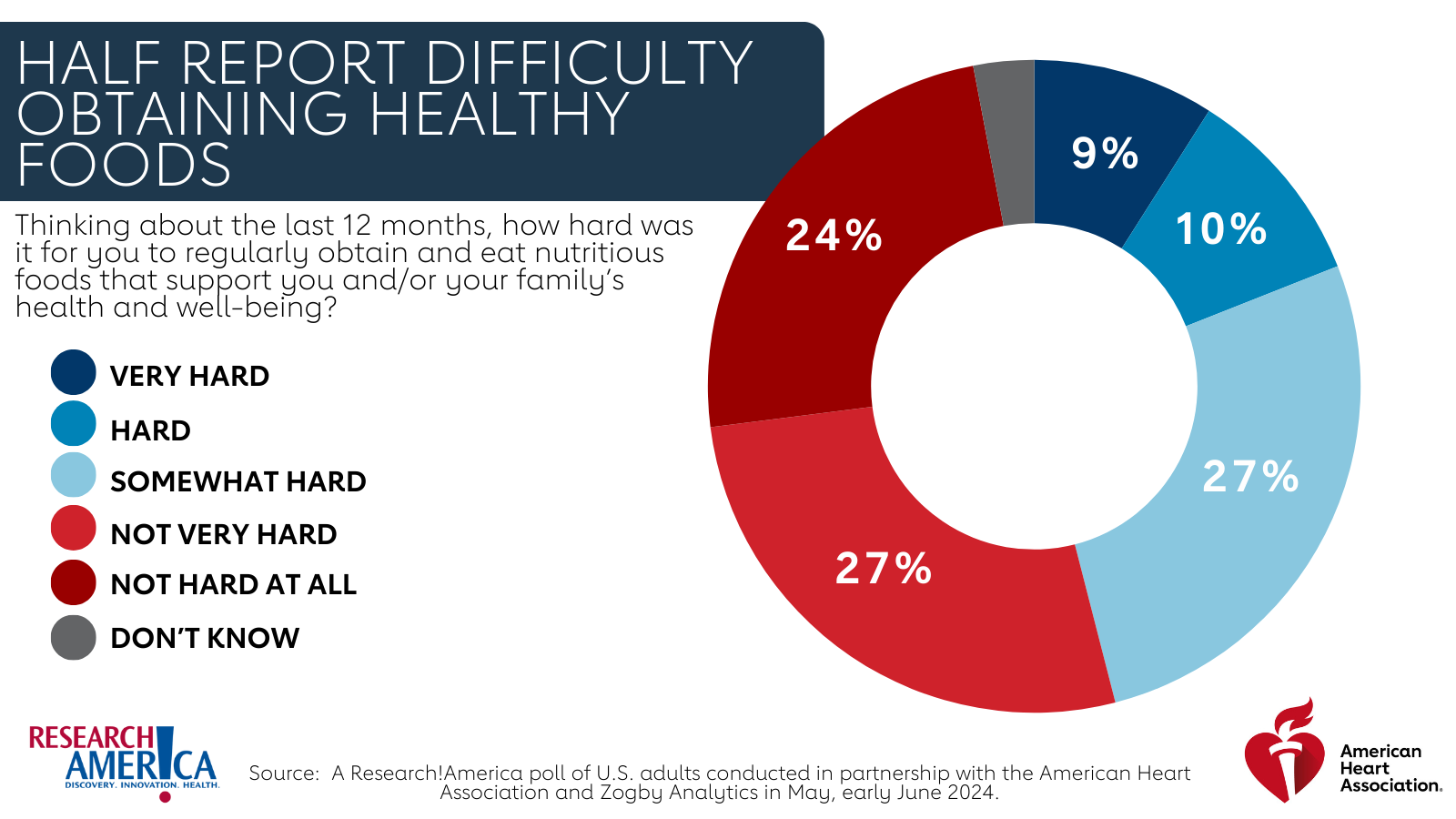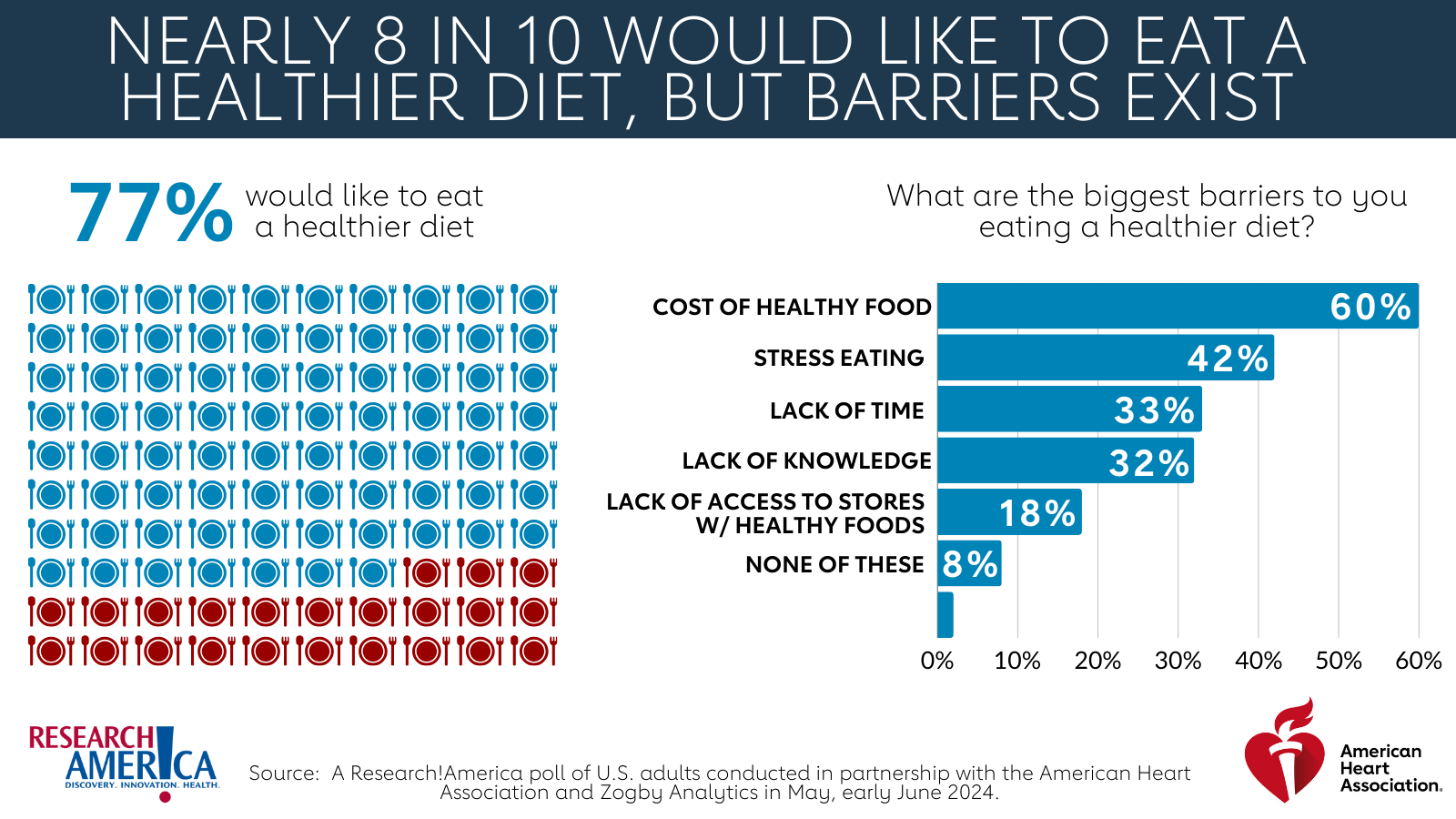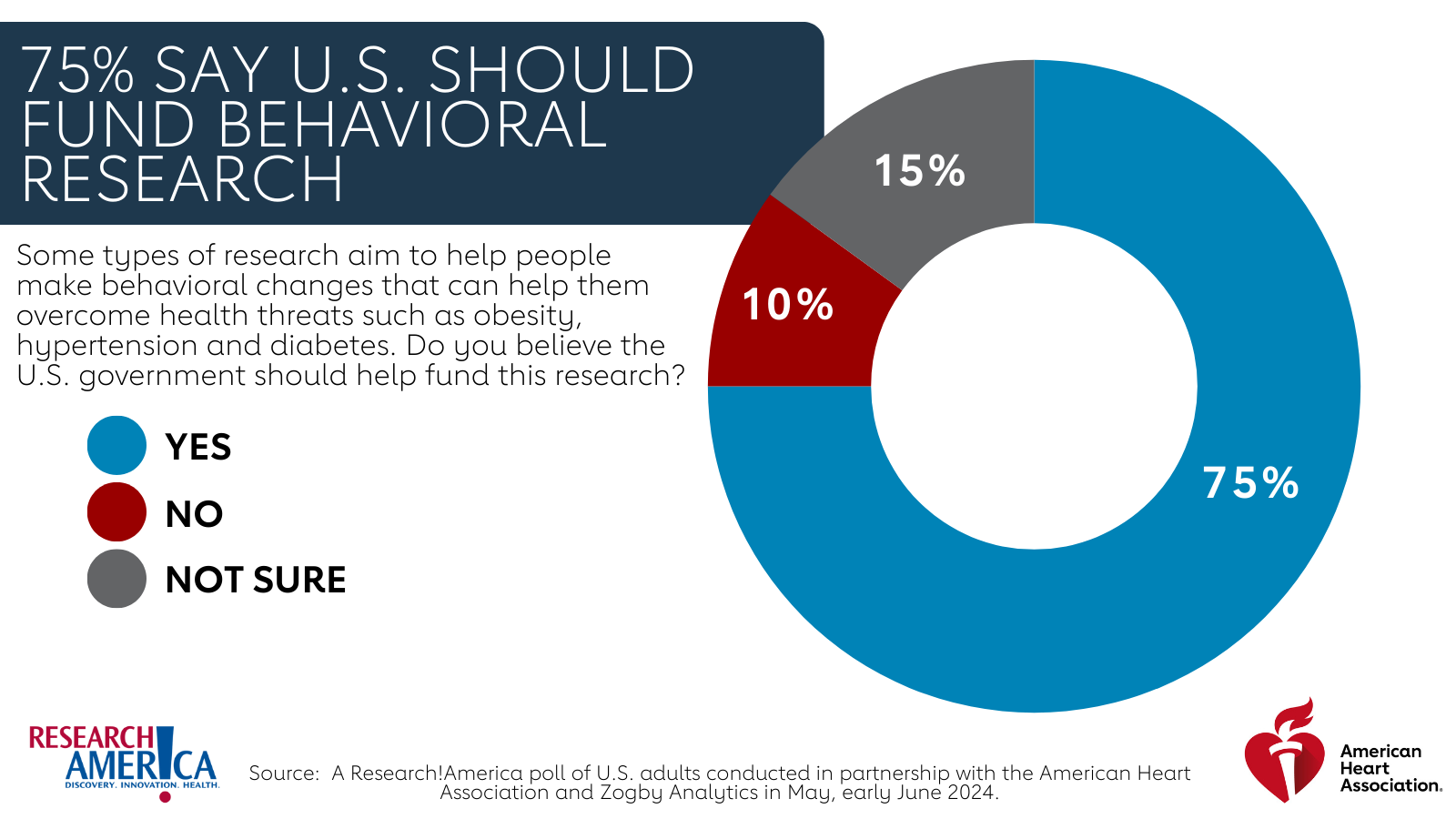National Survey Shows Affordability and Access to Nutritious Foods is a Challenge for Many Americans
Survey shows strong support for research to help people make behavioral changes to combat obesity, hypertension, and diabetes.
According to survey findings released today, a striking 21% of respondents said that they or someone close to them has experienced persistent hunger in the past year. Nearly half (46%) said it was at least somewhat hard for them to regularly obtain and eat nutritious foods. Further, more than half (54%) agree that the U.S. is not making enough progress in making nutritious food accessible and affordable. Commissioned by Research!America in partnership with the American Heart Association, the June 2024 national survey captures Americans’ views on food and nutrition.
 “These survey findings show that Americans are aware of the importance of eating a healthy diet, but at the same time illustrate the struggle many Americans have in doing so,” said Research!America President and CEO Mary Woolley. “Survey respondents say we aren’t making enough progress in this nation in overcoming obesity and its co-morbidities; the survey findings can serve as a baseline to gauge our progress in reducing these in the coming years.”
“These survey findings show that Americans are aware of the importance of eating a healthy diet, but at the same time illustrate the struggle many Americans have in doing so,” said Research!America President and CEO Mary Woolley. “Survey respondents say we aren’t making enough progress in this nation in overcoming obesity and its co-morbidities; the survey findings can serve as a baseline to gauge our progress in reducing these in the coming years.”
Respondents recognize the impact of food and nutrition on health and well-being.
Respondents identified not smoking (73%), safe and healthy living conditions (68%), and healthy eating habits (68%) as important factors in improving a person’s chance of a long and healthy life. When it comes to factors that impact weight, more than half of respondents say that diet (64%) and exercise (53%) contribute a great deal followed by access to food (48%), stress and anxiety (47%), and genetics (33%). Though a strong majority (76%) say their diet is somewhat or very healthy, most respondents (91%) think that unhealthy eating is a problem in the United States. Relatedly, 94% think that obesity is a very serious or somewhat serious problem in the U.S.

Food issues facing the nation mirror the challenges individuals face.
Americans cited the top five food issues facing the nation: Food prices (72%) tops the list followed by unhealthy diet (54%), inability to afford enough healthy food (48%) use of artificial ingredients (45%), and genetically modified foods (41%). When it comes to individuals, the top reported barrier is the same as for the nation: cost. Barriers to eating a healthier diet are the cost of healthy food (60%), stress eating (42%), lack of time to prepare healthy meals (33%) and lack of knowledge of what foods are healthy and how to prepare healthy meals (32%).
Food Is Medicine (FIM) initiatives and related programs lack visibility.
Food Is Medicine (FIM) initiatives are designed to address access and other gaps, but there is limited awareness about them. Only 24% of respondents have heard of “Food is Medicine” initiatives. Medically tailored meals (MTMs), home-delivered, nutritious meals prescribed by a doctor and customized for patients with severe chronic conditions, and produce prescriptions (PPs), free or discounted produce prescribed by a doctor to patients with a chronic condition, fall under the umbrella of FIM. Awareness of these programs is also limited with 22% saying they had heard of MTMs and PPs. Of those who said they were familiar with MTMs or PPs, most (84%) think programs like MTMs and PPs are important to improving health.
Three of four respondents support research to overcome health threats.
The survey revealed that 75% of respondents say that the U.S. should fund research aiming to help people make behavioral changes to overcome health threats such as obesity, hypertension, and diabetes. Respondents say that improving quality of life (92%), lowering health care costs (90%), and increasing life expectancy (90%) are persuasive reasons for increasing support for this research. Though 25% of respondents say that research about diet and nutrition cannot really be trusted because so many studies appear to contradict each other, a greater 61% say research is constantly improving our understanding about the health effects of what people eat and drink, so it makes sense that these findings appear to contradict prior studies.
Other notable findings:
- Respondents are curious (45%) about Ozempic, Wegovy, and other GLP-1 medications, but they are also cautious (64%), hesitant (47%), and concerned (45%).
- Respondents noted the opportunity to feel better and have more energy (68%), lose weight (60%), prevent future health conditions (56%), and improve physical appearance (55%) as top motivators for adopting a new eating pattern or diet.
- Most (85%) say they pay attention to nutritional information on the labels of food and beverage packages when shopping, at least some of the time.
- However, only 41% say that they fully understand the labels they are reading; 52% say they partially understand.
- 58% have a great deal of confidence or some confidence in the federal government to ensure the safety of the food supply in the U.S.
Portions of this data are included in the U.S. Health and the Future of Food report, released June 10 by Deloitte, the American Heart Association and Research!America, detailing the urgent challenges to creating a food system that effectively integrates nutritious food into health care for the prevention, treatment and care of cardiovascular disease and other chronic conditions.
For more than 30 years, Research!America has commissioned public opinion surveys to help understand Americans’ views on medical, health, and scientific research and other pressing issues related to public health, research, and innovation.
The online survey was conducted by Zogby Analytics on behalf of Research!America and the American Heart Association in late May, early June 2024, among 1,001 adults plus 1,205 additional adults for minority oversampling. The survey has a theoretical error of +/- 3.1 percentage points with a +/- 4.9% margin of error for the oversampled groups. Contact Glenn O’Neal, Senior Director of Communications, at 571-482-2737 or [email protected] with press inquiries.





